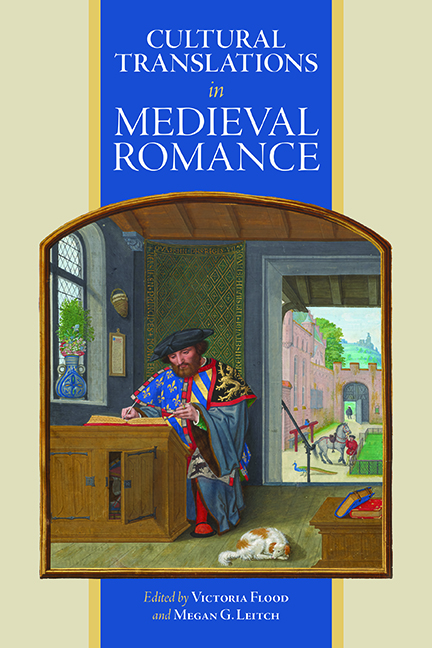Book contents
- Frontmatter
- Contents
- List of Contributors
- List of Abbreviations
- Introduction Insular Romance in Translation: New Approaches
- 1 Romantic Wales: Imagining Wales in Medieval Insular Romance
- 2 ‘Something remains which is not open to my understanding’: Enigmatic Marvels in Welsh Otherworld Narratives and Latin Arthurian Romance
- 3 The Supernatural Company in Cultural Translation: Dafydd ap Gwilym and the Roman de la Rose Tradition
- 4 Women and Werewolves: William of Palerne in Three Cultures
- 5 ‘Better a valiant squire than a cowardly knight’: Gender in Guruns strengleikr (The Lay of Gurun)
- 6 ‘Vinegar upon Nitre’? Walter Map’s Romance of ‘Sadius and Galo’
- 7 The Three Barriers to Closure in Hue de Rotelande’s Ipomedon and the Middle English Translations
- 8 Trojan Trash? The Seege or Batayle of Troye and the Learning of ‘Popular’ Romance
- 9 Poaching Romance: Fan Fiction Theory and Shared Medieval Narratives
- 10 Between Epic and Romance: The Matter of England and the Chansons de Geste
- 11 Geographies of Loss: Cilician Armenia and the Prose Romance of Melusine
- 12 ‘All this will not comfort me’: Romancing the Ballad in The Squire of Low Degree
- 13 Merchants in Shining Armour: Chivalrous Interventions and Social Mobility in Late Middle English Romance
- Index of Manuscripts
- General Index
- Miscellaneous Endmatter
6 - ‘Vinegar upon Nitre’? Walter Map’s Romance of ‘Sadius and Galo’
Published online by Cambridge University Press: 07 October 2022
- Frontmatter
- Contents
- List of Contributors
- List of Abbreviations
- Introduction Insular Romance in Translation: New Approaches
- 1 Romantic Wales: Imagining Wales in Medieval Insular Romance
- 2 ‘Something remains which is not open to my understanding’: Enigmatic Marvels in Welsh Otherworld Narratives and Latin Arthurian Romance
- 3 The Supernatural Company in Cultural Translation: Dafydd ap Gwilym and the Roman de la Rose Tradition
- 4 Women and Werewolves: William of Palerne in Three Cultures
- 5 ‘Better a valiant squire than a cowardly knight’: Gender in Guruns strengleikr (The Lay of Gurun)
- 6 ‘Vinegar upon Nitre’? Walter Map’s Romance of ‘Sadius and Galo’
- 7 The Three Barriers to Closure in Hue de Rotelande’s Ipomedon and the Middle English Translations
- 8 Trojan Trash? The Seege or Batayle of Troye and the Learning of ‘Popular’ Romance
- 9 Poaching Romance: Fan Fiction Theory and Shared Medieval Narratives
- 10 Between Epic and Romance: The Matter of England and the Chansons de Geste
- 11 Geographies of Loss: Cilician Armenia and the Prose Romance of Melusine
- 12 ‘All this will not comfort me’: Romancing the Ballad in The Squire of Low Degree
- 13 Merchants in Shining Armour: Chivalrous Interventions and Social Mobility in Late Middle English Romance
- Index of Manuscripts
- General Index
- Miscellaneous Endmatter
Summary
Walter Map's story of ‘Sadius and Galo’ is the longest self-contained narrative in Map's only extant work, the collection of anecdotes, satires, marvels and historical narratives now generally known as De nugis curialium (Of Courtiers’ Trifles). It is often characterised as a ‘courtly romance’ in Latin prose, but this classification is implicitly a contradiction in terms, since originally and by strict definition the word ‘romance’ applies only to compositions in the vernacular languages, rather than (or indeed, as opposed to) those in Latin. So how is this apparent contradiction to be explained? Is Map's tale simply an appropriation of the romance mode into a language environment in which it is essentially foreign, a text that consistently borrows distinctively ‘romantic’ themes and motifs in such a way as to offer what is, in effect, a translation of the romance mode into the language of ‘clerks’? Or should it be seen rather as an illustration of the extent to which Latin could also be seen as a natural vehicle for courtly romance, itself fully embodying the creative energies of the genre, without necessarily deferring to, or being subordinate to, other languages? Or would it be more useful to seek a tertium quid here, to rethink the genre of courtly romance in such a way as to emphasise both its essential vernacularity (together with the values implicit in its vernacularity, such as its secularity and its popular appeal) and its simultaneous openness to influence by, and interference from, clerkly Latin-language culture, thus defining it as a genre that is always and essentially implicated in an ongoing process of exchange between languages? From this perspective, ‘Sadius and Galo’ might perhaps be seen as a particularly clear example of this process in action: as a literary text that expresses, but also exploits, the inherent tensions between vernacular and Latin culture.
‘Sadius and Galo’ certainly suggests a confident familiarity with the narrative conventions and implied ideology of vernacular courtly romance, displaying none of the lack of confidence that might be expected of a text that is consciously at odds with its own identity. In fact, Map's work is more than just confidently familiar with its romance models. The tale he tells is carefully constructed in such a way as to accommodate a remarkably intense accumulation of ‘romantic’ themes and motifs within a relatively brief compass.
- Type
- Chapter
- Information
- Cultural Translations in Medieval Romance , pp. 117 - 134Publisher: Boydell & BrewerPrint publication year: 2022



